Newspaper seized, int’l media barred from Sudan Parliament
On Tuesday morning, the security apparatus confiscated the print run of El Jareeda newspaper for the second time in a week. Correspondents for national and international news media have also been barred from entering the Houses of Parliament in Sudan’s second city of Omdurman.
 A newspaper stand in Khartoum (File photo)
A newspaper stand in Khartoum (File photo)
On Tuesday morning, the security apparatus confiscated the print run of El Jareeda newspaper for the second time in a week. Correspondents for national and international news media have also been barred from entering the Houses of Parliament in Sudan’s second city of Omdurman.
Ashraf Abdelaziz, the editor-in-chief of El Jareeda newspaper told Radio Dabanga that the security services informed them that the reason for the confiscation was a report published by the newspaper about Sudan-Egypt relations. He added that “the apparatus described the report as not positive and that it is affecting the relations between the two countries”.
Abdelaziz said that the report included monitoring the stations passed by the relations between the two countries, against the background of the future visit by Egyptian President Abdelfattah Al Sisi, without including the opinion of the editor. He pointed out that the report also included a positive article on the Egyptian victories in Sudan’s October Revolution.
Parliament lockout
Also on Tuesday, the authorities banned a number of prominent international news agencies and satellite channels from entering the parliament to cover its sessions.
A number of agency correspondents said the guards denied them access, arguing that their names were ‘not on the list’.
Among the correspondents denied access to the parliament were the Turkish Anatolian correspondent, a BBC team, correspondents for Al Jazeera and AFP, and correspondent and reporter Mortada Ahmed of the Sudanese El Akhbar newspaper.
The Sudanese Journalists Network denounced the ban on the journalists as “a strange and reprehensible behaviour in which the journalists are insulted, not recognised and their right to information was confiscated in violation of the Sudanese Constitution and the Parliament”.
The network described this violent escalation against the press and journalists as reflecting the harassment by power and fear of freedom of opinion and expression.
Ongoing media curbs
The Media in Sudan are continuously subjected to confiscations of newspapers, and summons and detentions of journalists.
In the end of June, the cabinet extended the power of the government-controlled Press and Publications Council as well as restrictions on the media to online news outlets, when it passed amendments of the Media and Publication Act. A month later, the NISS restored prior-censorship of newspapers.
In early August, editors-in-chief and the head of the NISS in Khartoum agreed in a meeting to form a committee to deliberate on the so-called red lines set by the security apparatus for Sudanese media. New confiscations of newspapers were therefore briefly suspended.
However, the NISS began gagging the press again on August 27, when the print-runs of El Jareeda and El Tayyar were confiscated. No explanations were given. Four days later, NISS officers stopped the distribution of El Jareeda and El Tayyar again, together with the print-run of El Rai El Aam, without stating a reason.
Abdelaziz told Radio Dabanga at the time that “in the past there used to be ‘red lines’ not to criticise the president or vice-presidents of Sudan, members of the security apparatus, and the police. However, these lines have become very unclear and unpredictable now”.
In early September, three young journalists were summoned by security agents in Khartoum and El Gedaref. A Sudanese reporter was bannedfrom writing. The print-run of El Saiha daily, the newspaper he was writing for, was confiscated on September 8.
Sudan is ranked at the bottom of the World Press Freedom Index by Reporters Without Borders.











 and then
and then